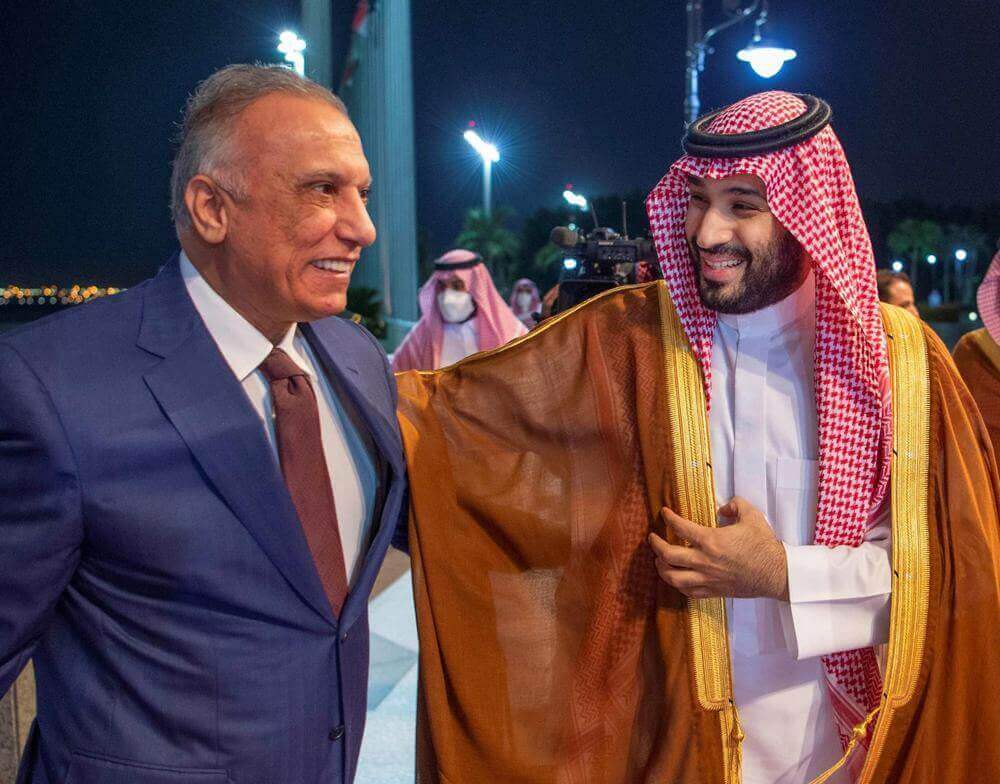During his visit to Riyadh on Saturday, Saudi officials asked Iraqi Prime Minister Mustafa al-Kadhimi to convey to Iran the Kingdom’s interest in restarting normalisation talks. To this end, both Kadhimi and Saudi Crown Prince Mohammed bin Salman (MBS) affirmed their support for the Yemen ceasefire and for “ strengthening efforts to stop the war and establish peace.”
Baghdad maintains close economic ties with both Riyadh and Tehran. In recent times, Kadhimi has stressed that he wishes to improve relations with Saudi Arabia even further. Similarly, Saudi Arabia has been trying to woo Iraq with economic incentives to counter Iran’s influence. For instance, in 2020, Saudi Arabia opened the Arar land border crossing with Iraq for the first time since Saddam Hussein’s invasion of Kuwait in 1990. Furthermore, last April, Riyadh established a $3 billion fund in Iraq aimed at promoting cross-border investment.
Saudi Crown Prince Mohammad bin Salman received the Iraqi Premier Mustafa Al Kadhimi earlier today. Can be seen at the end of this clip driving him from the Airport to the Royal Palace in Jeddah, a very special personal gesture, shows how warm the relationship between both sides. https://t.co/rzkFK6JkGA
— Eyad Alrefai (@EyadAlRefaei) June 25, 2022
Carrying a message from Saudi Arabia, Kadhimi travelled to Iran Sunday, where he met with Iranian President Ebrahim Raisi. They discussed “the most important regional issues that are of common interest,” especially regarding regional peace and stability. Like in his meeting with MBS, Kadhimi and Raisi emphasised on the importance of maintaining the extended two-month truce reached between the Iran-backed-Houthi rebels and the Saudi-led coalition in Yemen. “The two countries agreed to announce their support for a ceasefire in Yemen and the need for a dialogue to end the war that has caused a lot of troubles for the people of this country,” Kadhimi said.
Raisi also said that the continuation of Yemen’s seven-year-long war was a “fruitless” affair and “must be ended as soon as possible.” He added, “Lifting the siege of Yemen and the Yemenis, and the Yemeni-Yemeni dialogue can solve the problems of this country and end the suffering of the dear Yemeni people.”
تغطية مصورة لمراسم استقبال رئيس مجلس الوزراء @MAKadhimi ، من قبل ولي عهد المملكة العربية السعودية الأمير محمد بن سلمان آل سعود. pic.twitter.com/ShPBRK0sZJ
— المكتب الإعلامي لرئيس الوزراء 🇮🇶 (@IraqiPMO) June 25, 2022
“Good bilateral and regional relations between Iraq and Iran can be very effective in role-playing of the two countries in the region and international issues,” the Iranian president emphasised.
Kadhimi is also keen on restarting negotiations because Iraq maintains cordial ties with both neighbours. Iraq, a Shia-majority country, has improved relations with Iran, despite fighting a brutal war in the 1980s; today, Tehran has established a strong footprint in the country, especially through its control of Shia militias.
In this respect, Kadhimi’s visits to Riyadh and Tehran were an “affirmation of Iraq’s prominent role in the region and its efforts in achieving calm and constructive dialogues,” Kadhimi’s office said in a statement on Sunday. “Iraq’s role in the region was commended for the efforts in consolidating peace which enhances Iraq’s regional and international status,” it declared.
أهم ما تحدث به رئيس مجلس الوزراء @MAKadhimi خلال المؤتمر الصحفي المشترك مع الرئيس الإيراني والذي عقد اليوم في العاصمة الإيرانية طهران :
— المكتب الإعلامي لرئيس الوزراء 🇮🇶 (@IraqiPMO) June 26, 2022
🔵 العلاقات العراقية - الإيرانية هي علاقات وثيقة ذات بعد جغرافي وتاريخي وثقافي وديني، العلاقة مع الجمهورية الإسلامية الإيرانية مهمة جداً . pic.twitter.com/jAzuKyCyO9
Although the efforts to revive talks were not directly mentioned in statements released by any of the three countries, reports indicate that Iraq has been urging both sides to commit to negotiations since the fifth round of talks collapsed due to differences. In fact, an Iraqi official told the Associated Press that Kadhimi’s visit was specifically aimed at “reactivating talks.”
Talks between the two rivals began in April last year in Baghdad as both Riyadh and Tehran expressed interest in pursuing negotiations to resolve their longstanding differences. Although talks continued for a year, they broke down in April after Iran suspended talks without citing any particular reason.
Iraqi PM Mustafa al Kadhimi and Iran's President Ebrahim Raisi hold talks in Tehran as part of efforts to renew relations between Tehran and Riyadh pic.twitter.com/IlnNV9NDpa
— TRT World Now (@TRTWorldNow) June 26, 2022
Both countries have had major issues with one another for a long time and tensions spiralled out of control when the Saudi embassy in Tehran was attacked by Iranian mobs in 2016 over Saudi Arabia’s execution of a prominent Shia cleric. Following the attacks, the Kingdom officially broke diplomatic ties with the Islamic Republic.
Since then, the two sides have clashed numerous times, especially in war-torn Yemen. Saudi Arabia has led an international coalition in the country that has been launching airstrikes against the Iran-backed Houthi rebels. The Houthis have also targeted Saudi energy infrastructure, including several Saudi Aramco facilities.

